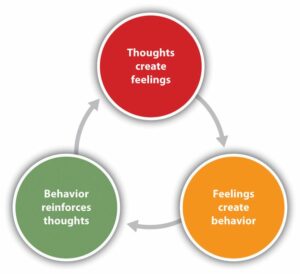Mental contamination is one of the most common symptoms of OCD. It can involve thoughts, images, or feelings that are considered “dirty” or “unsafe.” People with OCD often feel like they need to get rid of these thoughts and images as quickly as possible, which can be very difficult. In this blog post, we will discuss the reality of mental contamination and how it affects people with OCD. We will also explore ways to cope with this symptom.
Contents
What Is OCD Mental Contamination?
 OCD mental contamination is when a person with OCD becomes obsessed with the idea that they have been contaminated by something – usually a substance or object. This can lead to them feeling dirty, unclean, or even toxic. They may believe that they have contracted a disease or illness, and this can cause them a great deal of anxiety and distress.
OCD mental contamination is when a person with OCD becomes obsessed with the idea that they have been contaminated by something – usually a substance or object. This can lead to them feeling dirty, unclean, or even toxic. They may believe that they have contracted a disease or illness, and this can cause them a great deal of anxiety and distress.
OCD mental contamination can also involve becoming obsessed with the idea that you have contaminated others. This can lead to you feeling guilty and anxious, and you may go to great lengths to avoid contact with others. Studies have found that contamination OCD is the most common subtype of OCD, affecting around 12% of people with the disorder.
Moreover, people with this subtype of OCD are more likely to experience higher levels of anxiety, depression, and functional impairment than those with other subtypes. So, if you think you may be suffering from OCD mental contamination, it’s important to seek professional help.
This is a very real and distressing symptom of OCD, and it can have a significant impact on your life. If you are struggling with OCD mental contamination, please remember that you are not alone and there is help available.
How To Recognize It?
It is believed that recognizing OCD types can help in earlier diagnosis and a better understanding of the illness. Mental contamination is one type of OCD that is not commonly talked about. So the symptoms can be difficult to identify. But here are some key things to look out for:
- A preoccupation or fear of becoming contaminated by germs, dirt, toxins, chemicals, or other “contaminants”
- A strong belief that if you become contaminated, you will experience severe consequences, such as illness, death, or losing control
- Avoidance behaviors, such as excessive handwashing, showering, or cleaning
- Checking behaviors, such as repeatedly washing your hands or clothes, or checking to make sure the oven is turned off
- Intrusive thoughts or images about contamination
- Spending long periods of time trying to relieve anxiety by washing, cleaning, or avoiding contaminated objects or places
- Significant distress or problems in daily life due to OCD symptoms
The symptoms and signs can be different for everyone. If you think you or a loved one may have OCD, it’s important to seek professional help. A mental health professional can assess whether the symptoms are part of OCD or another mental health disorder.
OCD can be a debilitating and isolating disorder. And this mental contamination is something that is usually not talked about. So I hope this article provides some clarity and understanding. If you think you may have OCD, please reach out for help. Remember, you are not alone.
What Causes OCD Mental Contamination?
 There is no single cause of OCD mental contamination. However, there are a number of factors that may contribute to its development, including:
There is no single cause of OCD mental contamination. However, there are a number of factors that may contribute to its development, including:
Genetics
OCD often runs in families, so it may be partially due to genetic factors. Studies have found that people with OCD are more likely to have relatives with the disorder. For example, if your parent has OCD, you may be more likely to develop the disorder. However the chances are not 100%, so other factors are likely involved as well.
Brain structure and function
There are some differences in the brains of people with OCD. For example, people with OCD may have higher levels of activity in the areas of the brain that control attention and emotion. It is also believed that a chemical called serotonin may play a role. This is a chemical that helps to send messages between the brain cells.
Environment
Your environment may also play a role in the development of OCD mental contamination. If you live in a cluttered or messy home, you may be more prone to developing OCD mental contamination. Also, if you’re constantly exposed to germs and bacteria, you may be more likely to develop OCD mental contamination.
These causes are general and found in many people with OCD mental contamination.
Other risk factors
 It’s important to remember that everyone is different and there may be other factors that contribute to the development of OCD mental contamination. Some of these are listed below:
It’s important to remember that everyone is different and there may be other factors that contribute to the development of OCD mental contamination. Some of these are listed below:
- Experiencing trauma or abuse
- Having a history of anxiety or depression
- Low self-esteem
- Doubting your own abilities
- Perfectionism
Obsessive-compulsive disorder is a mental illness that can cause significant distress and impairment. And mental contamination can make it even harder to manage OCD. If you think you may have OCD mental contamination, it’s important to seek professional help. A therapist can help you understand your thoughts and feelings, and develop healthy coping mechanisms. Treatment can make a big difference in your quality of life.
How To Diagnose?
The diagnosis is usually made by a clinical psychologist or psychiatrist. A family doctor can also make the diagnosis if they are familiar with OCD. There is a proper method for diagnosing OCD.
- The first step is to rule out any medical conditions that could be causing the symptoms.
- The second step is to make sure that the person has obsessions and compulsions that are time-consuming and cause distress.
- Then, a professional will make sure that the person’s obsessions and compulsions are not due to the use of drugs or alcohol or any lifestyle changes.
- In the final step, a professional will make sure that the person’s symptoms are not caused by another mental disorder, such as depression or anxiety. Because people with depression or anxiety can also have obsessions and compulsions.
In addition to the clinical interview, a mental health professional can also use questionnaires and rating scales to assess a person’s OCD symptoms. The most commonly used measure to assess OCD is the Yale-Brown Obsessive Compulsive Scale (Y-BOCS). The Y-BOCS is a clinician-administered scale that consists of ten items, each of which is rated on a scale from 0 to four, with higher scores indicating more severe symptoms.
And with OCD mental contamination, the diagnosis is made by the same process. So, after an accurate diagnosis of the condition, the professional will make a treatment plan. There are different types of treatment for OCD mental contamination. You need to find the right one that works for you.
How To Treat OCD Mental Contamination?
There are many ways that people with OCD can treat mental contamination. Some of the first-line treatment options are listed below:
Cognitive Behavioral Therapy (CBT)
 This is a type of therapy that helps people change their thinking patterns and behaviors. CBT has been shown to be an effective treatment for OCD. It focuses on helping people with OCD to identify and challenge their thoughts and beliefs about contamination. During a session of CBT, a therapist will help you to manage your exposure to contamination and practice coping skills.
This is a type of therapy that helps people change their thinking patterns and behaviors. CBT has been shown to be an effective treatment for OCD. It focuses on helping people with OCD to identify and challenge their thoughts and beliefs about contamination. During a session of CBT, a therapist will help you to manage your exposure to contamination and practice coping skills.
Moreover, there are several techniques in CBT that your therapist may use to help you treat your mental contamination. These techniques include:
- Talk therapy: This involves talking with your therapist about your thoughts, feelings, and experiences. This can help you to understand your OCD and learn how to manage your symptoms.
- Acceptance and commitment therapy: This type of therapy focuses on helping you to accept your thoughts and feelings about contamination. It also helps you to commit to making changes in your life.
- Dialectical behavioral therapy: This type of therapy focuses on helping you to cope with your emotions. It also helps you to learn how to be more mindful of your thoughts and behaviors.
Exposure and Response Prevention (ERP)
This is a type of CBT that focuses on exposure to the feared situation or object and then learning to resist the urge to perform compulsions. This can be done by gradually increasing exposure to the feared stimulus while working on learning to resist compulsions. ERP has been shown to be an effective treatment for OCD, with research showing that it can lead to long-term remission of symptoms.
While ERP is considered the gold standard treatment for OCD, it can be difficult to implement and requires a lot of commitment from the individual. Additionally, ERP can be challenging for individuals with OCD who have difficulty tolerating anxiety and distress. However, it is important to remember that the anxiety caused by exposure is temporary and will eventually decrease as you learn to manage your OCD.
Medication
This is something that a psychiatrist can help you with. If you have OCD, you may be prescribed medication to help relieve your symptoms. There are different types of medication that can be effective for OCD, and it is important to work with a psychiatrist to find the right medication for you. Some of the common examples of medications used to treat OCD include:
- Selective serotonin reuptake inhibitors (SSRIs)
- Serotonin and norepinephrine reuptake inhibitors (SNRIs)
- Tricyclic antidepressants (TCAs)
- Monoamine oxidase inhibitors (MAOIs)
- Anti-anxiety medications
These medications can be very effective in helping to reduce the symptoms of OCD. However, it is important to remember that they are not a cure for OCD. They can help to manage the symptoms, but they will not cure the disorder. If you stop taking the medication, the symptoms may come back.
Support groups
 There are many support groups available for people with OCD. These groups can provide valuable information and support from others who understand what you are going through. Many local mental health organizations offer OCD support groups. You can also find online support groups that can be accessed from anywhere in the world.
There are many support groups available for people with OCD. These groups can provide valuable information and support from others who understand what you are going through. Many local mental health organizations offer OCD support groups. You can also find online support groups that can be accessed from anywhere in the world.
Also, there are types of support groups that are led by different people. Some groups are focused on providing education about OCD and its treatment, while others may be more focused on offering emotional support. No matter what type of support group you choose to attend, know that there are people out there who understand and can offer helpful advice.
If you feel like you need more support than what a support group can offer, consider seeking out individual therapy or counseling. A therapist who specializes in treating OCD can help you learn more about your condition.
Self-help strategies
OCD mental contamination can be a difficult thing to live with. It can be hard to know how to deal with it or even what it is. Many people don’t understand what goes on in the mind of someone with OCD. Here are some self-help strategies that may help you deal with your OCD mental contamination:
- Avoidance: This may seem like an obvious one, but avoiding the things that trigger your OCD can be helpful. If you know that certain activities or situations will trigger your OCD, try to avoid them.
- Challenge your thoughts: In order to challenge your OCD, you need to first be aware of the thoughts that are causing you anxiety. Once you know what these thoughts are, you can start to challenge them. Are they really true? Do you have any evidence to support them?
- Relaxation techniques: You can try different relaxation techniques to help you deal with your OCD. This may include deep breathing, progressive muscle relaxation, or meditation.
- Healthy lifestyle: OCD mental contamination can be very exhausting. It is important to take care of yourself by eating a balanced diet, getting enough sleep, and exercising regularly.
- Keep a journal: Journaling is considered a form of exposure therapy. This means that by writing down your thoughts, you are facing your fears head-on. Writing about your OCD can help you to better understand your thoughts and feelings. It can also help you to see how your OCD is affecting your life.
So these are some of the self-help strategies that you can use to deal with your OCD mental contamination. Remember, there is no one-size-fits-all approach to dealing with OCD. What works for one person may not work for another. Just keep trying different things until you find what works for you.
Conclusion
Conclusively, OCD mental contamination is considered a real phenomenon by the mental health community. It is a debilitating and intrusive disorder that can wreak havoc on an individual’s life. If you or someone you know is struggling with OCD, please reach out for help. There are many resources available to those who need them.
While there is no permanent cure for OCD, with proper treatment, people can and do recover from the symptoms. If you are struggling with OCD, know that you are not alone and there is help available, You can also contact Therapy Mantra for more tips. Overall, with the right treatment and self-care, you can manage your OCD and live a happy and fulfilling life.
We hope this article was helpful in shining some light on the topic of OCD mental contamination. If you have any questions or would like to connect with our team of experts, do contact us. We’d be happy to help in any way we can! Contact us today to learn more about our services. You can also book an online counseling and therapy session or download our free OCD treatment app on Android or iOS.


